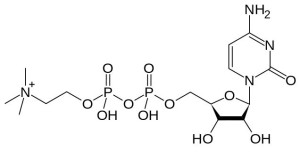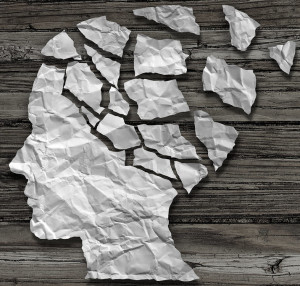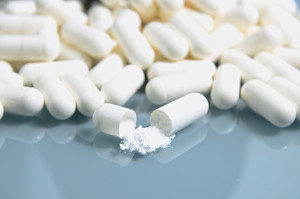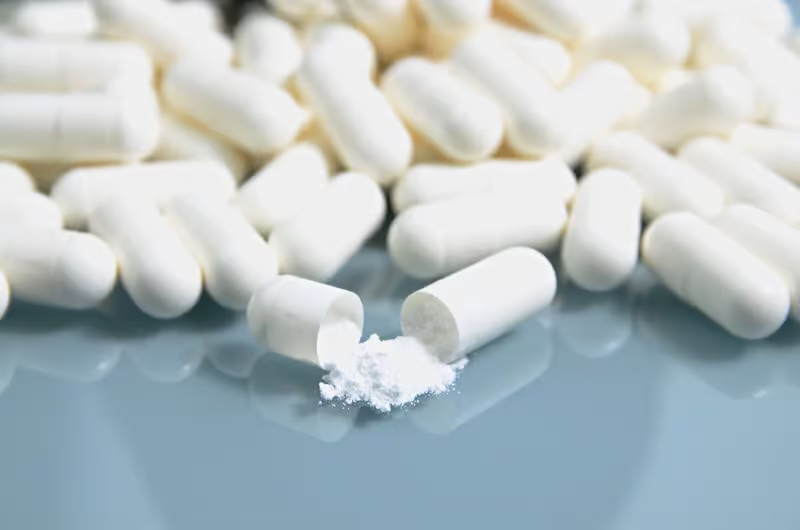Table of Contents
CDP-Choline (Cytidine Diphosphate Choline or cytidine 5′-diphosphocholine) is also known as Citicoline. This naturally occurring choline source is present in every cell in your body.
CDP-Choline is unique as a choline source. Once it’s digested it separates into cytidine and choline. When it gets to your brain it converts back to CDP-Choline.
This choline is needed to synthesize the neurotransmitter acetylcholine (ACh). ACh is a primary neurotransmitter released by neurons. This electrical signaling between neurons is involved in memory, learning, cognition and recall.
Cytidine is a component of Ribonucleic acid (RNA). This molecule is involved in coding, decoding, regulation and the expression of genes. But once it gets into the brain, it converts to uridine.
The signaling going on between neurons tends to grab choline molecules from cell membranes when choline is in short supply. This is where uridine steps in. It repairs those same cell membranes. To maintain neuron integrity.
CDP-Choline helps:
- Brain Optimization: CDP-Choline provides uridine once it enters in the brain. Uridine repairs, rebuilds and re-supplies the components needed for neuron repair. To keep signaling between neurons optimized for memory, learning, cognition and recall.
- Neurotransmitters: CDP-Choline enhances the release of norepinephrine, dopamine, serotonin, and acetylcholine in the brain.[i] [ii]
- Brain Energy: CDP-Choline increases Adenosine triphosphate (ATP) in brain cells. ATP is produced in your mitochondria and your main source of cellular energy.
Overview
CDP-Choline is a type of choline that is present in every cell in your body. You can also get it from eating organ meats like liver.

Choline is considered an essential nutrient because your body uses it faster than it can produce it. So you need to supplement choline either from food or a supplement.
You need choline for the production of the neurotransmitter acetylcholine. And to form phosphatidylcholine (PC), used in building cell membranes.
In fact, choline is so vital to cognition and nerve function that, without it, we couldn’t move, think, sleep or remember anything.
CDP-Choline has the unique ability to convert to cytidine and choline once it passes through your digestive system. After it crosses the blood-brain barrier, it converts back to CDP-Choline.
The left-over cytidine in your blood can convert into uridine in your brain. Uridine is necessary for repairing cell membranes.
CDP-Choline is involved in memory and cognitive functions. And provides energy for the brain to conduct sustained mental effort.
CDP-Choline vs. Alpha GPC vs. Choline Bitartrate: What’s the Difference?
Choline is a water-soluble nutrient similar in composition to B-vitamins. CDP-Choline, Alpha GPC, Choline Citrate and Choline Bitartrate are all sources of choline.
CDP-Choline (cytidine 5′-diphosphocholine): Is about 18% choline by weight and easily crosses the blood-brain barrier. Your body naturally synthesizes choline into CDP-Choline (Citicoline) in your brain.
Taken as a supplement, it’s then converted to cytidine and choline in your gut. Once it crosses the blood-brain barrier it’s converted back to CDP-Choline. The choline then assists cell membranes, and helps create acetylcholine.
 The added benefit of CDP-Choline is with cytidine. Cytidine can convert into uridine which is critical in the brain. Uridine is needed to synthesize the phosphatidylcholine (PC) in neuron membranes. It helps repair neurons.
The added benefit of CDP-Choline is with cytidine. Cytidine can convert into uridine which is critical in the brain. Uridine is needed to synthesize the phosphatidylcholine (PC) in neuron membranes. It helps repair neurons.
Choline Bitartrate: An economical form of choline, and about 40% choline by weight. So 1 gram of Choline Bitartrate offers 400 mg of actual choline. It does not easily cross the blood-brain barrier. So you won’t experience the same level of nootropic benefits as with Alpha GPC or CDP-Choline.
Alpha GPC: About 40% choline by weight and easily crosses the blood-brain barrier. Alpha GPC naturally occurs in your brain as a byproduct of phosphatidylcholine (PC). When your brain needs more choline, and the choline floating around in your brain is running low, it breaks down PC from cell membranes. And turns it into Alpha GPC.
Your body and brain loves it when you use Alpha GPC. Because it doesn’t have to cannibalize its own cells to get more choline.
How does CDP-Choline Work in the Brain?
CDP-Choline boosts brain health and function in several ways. But two in particular stand out.
- CDP-Choline is metabolized in the gut wall and liver to form choline and cytidine. Once choline and cytidine cross the blood-barrier they re-synthesize back into CDP-Choline (Citicoline).[iii]
In the brain choline aids in the synthesis of acetylcholine. And the release of dopamine.[iv] Acetylcholine is a neurotransmitter associated with memory and learning.
- CDP-Choline helps repair neural membranes. Choline is a precursor to the neurotransmitter acetylcholine (ACh) in your brain. ACh carries nerve impulses across synapses. And then is broken down by enzymes.
ACh is then reassembled for reuse. But this breakdown/reassembly process isn’t foolproof. Some ACh gets lost in the process. So your brain goes looking for more choline to make ACh.
If there isn’t enough choline in your blood, it gets it from the phosphatidylcholine (PC) that makes up the outside of the cell membrane of your neurons. The PC in the cell membrane releases choline to help make acetylcholine.
When your neurons lose too much choline, they lose integrity. Nerve impulses break down, and cognitive abilities decline.[v]
 Scientists in the lab at MIT showed that this is where uridine steps in. The cytidine in CDP-Choline converts to uridine in your body. And it works as a bridge between choline and neuron membrane synthesis.
Scientists in the lab at MIT showed that this is where uridine steps in. The cytidine in CDP-Choline converts to uridine in your body. And it works as a bridge between choline and neuron membrane synthesis.
Uridine is needed to synthesize the PC in neuron membranes. It is first converted to CDP-Choline. Which is then synthesized into new PC. This new PC can then repair damaged neuron membranes. Membranes that were raided to make acetylcholine.[vi]
How things go bad
As we get older, our brain chemistry and energy metabolism changes. This can happen at any age once we enter our adult years.
↓ Brain cell membranes degenerate
↓ Recall, reaction time and mood diminish
↓ Acetylcholine levels decline[vii]
All of these changes can happen at any age. And our bodies are influenced by the food we eat, what we drink, lifestyle habits, the air we breathe and more.
So CDP-Choline can help for age-related cognitive decline, as well as a student looking to do better in school. By boosting acetylcholine and dopamine. And rebuilding neurons in the brain.
CDP-Choline benefits
Research from hundreds of studies have shown that CDP-Choline will:
- Boost cognition[viii]
- Increase brain energy and speed up formation of brain membranes[ix]
- Boost production of acetylcholine[x]
- Increase blood flow in your brain[xi]
- Offset the harmful effects of stroke[xii]
- Improve memory and learning ability[xiii]
- Boost cognitive performance and memory in Alzheimer’s patients[xiv]
CDP-Choline is water-soluble and quickly enters your brain after you take it. In fact, studies show it has nearly 100% bioavailability in your body. Take it orally or intravenously and your body absorbs the same amount.
Once in your brain it boosts signal transmission, and repairs neurons. CDP-Choline improves your brain function and memory by directly increasing levels of acetylcholine and dopamine. And repairs neurons at the same time.
How does CDP-Choline feel?
The most profound indication of the power of this supplement is with those who have suffered a stroke.
Stroke survivors report that after continued usage of CDP-Choline, most of the noticeable effects of the stroke are gone. Including muscle paralysis and weakness.
 Neurohackers report they are better able to concentrate and focus. And experience a significant boost in cognition.
Neurohackers report they are better able to concentrate and focus. And experience a significant boost in cognition.
You can feel more mentally alert. And you may even ease the fatigue associated with clinical depression by using CDP-Choline.
Some use CDP-Choline as an alternative to the stimulants prescribed for ADHD.
CDP-Choline Clinical Research
In a study at the University of Utah, 75 healthy males were given 250 mg, 500 mg of CDP-Choline, or a placebo. Tests were recorded after 28 days of supplementation.
The adolescent males receiving 250 or 500 mg of CDP-Choline showed improved attention and psychomotor speed. And reduced impulsivity compared to adolescent males who received placebo.
This study indicates CDP-Choline is effective even in younger age groups. And can be particularly helpful to those dealing with ADHD.[xv]
CDP-Choline Enhances Cognition
A study published in Food and Nutrition Sciences assessed the potential cognitive-enhancing effects of Citicoline (CDP-Choline) in healthy, adult women.
This double-blind, randomized, placebo-controlled trial worked with 60 healthy women from 40 – 60 years old. Each volunteer was given a daily dose of 250 mg or 500 mg of Citicoline, or a placebo for 28 days.
The women who took either dose of Citicoline for 28 days showed a significant improvement in cognition.
The researchers suggested that Citicoline may improve attentional performance in middle-aged women. And it might eliminate the attention deficits associated with central nervous system disorders (i.e. ADHD).
CDP-Choline Improves Memory
Researchers in Japan studied 16 men and women who were given either 500 mg or 2000 mg of Citicoline for 6 weeks. Magnetic resonance spectroscopy (MRS) was used to study the brains of the participants at the end of the study.
The research team found ATP in the neurons of those in the study increased by over 14%. And membrane phospholipids were boosted by over 32%. These finding were in specific areas of the brain associated with cognition. And the effect was even more pronounced in the group that received the lower dose of Citicoline.
The researchers concluded that Citicoline supplementation could help prevent cognitive decline associated with aging. Along with an increase in brain energy reserves and utilization. And an increase in the components needed to synthesize and maintain cell membranes.
CDP-Choline Recommended Dosage
Recommended CDP-Choline dosage is 250 – 500 mg per day. Taken no more than twice per day. Two daily doses would be one CDP-Choline dose in the morning, and one in the early afternoon.
If you’re adding CPD-Choline to your stack with a racetam, a typical ratio would be 250 mg of Citicoline to 1 gram of Aniracetam or 4 grams of Piracetam.
CDP-Choline Side Effects
Recommended dosages even for extended periods are considered well-tolerated and safe. While CDP-Choline is considered non-toxic, it is possible to experience toxicity with too much choline in your body.
If you experience trouble sleeping, headache, diarrhea, low or high blood pressure, nausea, blurred vision or chest pain – you should stop using CDP-Choline.
Type of CDP-Choline to Buy
 CDP-Choline is sold in capsule and powder form. Capsules are usually 250 – 500 mg each. 500 mg of CDP-Choline in powder form is equivalent to 2-level 1/8 tsp scoops.
CDP-Choline is sold in capsule and powder form. Capsules are usually 250 – 500 mg each. 500 mg of CDP-Choline in powder form is equivalent to 2-level 1/8 tsp scoops.
Cognizin® is a patented, allergen-free, and water-soluble form of CDP-Choline shown in clinical trials to boost brain cell membrane formation by 26%. And increase brain energy by 13.6%.[xvi]
CDP-Choline is often found in pre-formulated nootropic stacks. But as Cognizin® is only offered in premium stacks.
You get an effective 250 mg Citicoline in Click for Mind Lab Pro® including effective doses of 10 brain enhancing nootropic compounds.
I recommend Mind Lab Pro® because it addresses all aspects of anxiety, memory and cognitive enhancement, stabilizes mood, brain repair, and maintenance. See my full Mind Lab Pro review for more.
Nootropics Expert Recommendation
I recommend using CDP-Choline as a nootropic supplement.
CDP-Choline is brain food. And is a natural substance found in every cell in your body.
You can get choline from some of the food you eat. But adequate levels of CDP-Choline are only found in organ meats like liver. So to get its benefits you must take it as a supplement.
CDP-Choline is vital to maintaining optimal brain health. And has been shown to increase cognitive energy, boost brain function, enhance communication between neurons, and protect neural membranes from free radical damage.
You get an effective 250 mg Citicoline in Click for Mind Lab Pro® including effective doses of another 10 brain enhancing nootropic compounds..
I suggest supplementing 250 – 300 mg twice per day. And CDP-Choline is a great compliment to a stack including any nootropic from the racetam-family. Anything that causes an increase in uptake of acetylcholine in your brain.
You need to provide your brain with the CDP-Choline it is demanding. Or it starts cannibalizing your own brain cells to make more acetylcholine. Signs that you’re lacking adequate choline are headaches.
When using CDP-Choline with one of the racetams start with a ratio of 1:4. For example, 250 mg of CDP-Choline to 1,000 mg of Aniracetam.
Stroke survivors may want to up the dose to 2,000 mg per day.
I use and recommend Click for Mind Lab Pro® which includes effective doses of 11 brain enhancing nootropic compounds including 250 mg of Citicoline.










Join The Discussion - 294 comments
Erik
January 30, 2019
David,
Actually i should be more specific, i am taking Performance Lab Mind
Citicoline, 250 mg
Phosphatidylserine, 100 mg
N-Acetyl-L-Tyrosine, 300 mg
Maritime Pine Bark Extract, 75 mg
Seems like on the days i take those or if i take it several days in a row i get real sensitive to light, not so much natural light but electronic lights, TV Screens, phone screens, computer screens etc
David Tomen
January 31, 2019
Erik, I’ve never seen any of these ingredients associated with blue light sensitivity. I suggest doing a general search and find out what causes this type of sensitivity. Including underlying health issues, certain drugs, and possibly some supplements.
Erik
January 30, 2019
David,
Have you ever heard of these choline sources causing vision issues like sensitivity to light, it seems like when i take citicholine my eyes are really sensitive when i watch TV, or computer screens, phones etc. I dont recall Alpha GPC doing that
Gabriel
January 17, 2019
I do not think my probleme is with my cholinergix system since i have a excellent memory like superior i remember stuff from the past and i am known to have the best memory in my familly my probleme that i am fixing over the year is with my Dopaminergic system, i am 40 years old man and i have Adhd since a child took ritalin has a kid from 7 to 11 then pursuie my life without never looking back at this issue… Over the past year i have experience with a lots of nootripoics, and right now i think my dopaminergix system is reaparing itself a bit i tend to need less nootropics depands ont the days ! Im taking right now ” Uridine Monophosphate 300 mg 1 are 2 times a day, choline from bithrate are alpha gpc ( experiencing right now) but i will switch to cdp choline, but i dont need a lot of that stuff, + i take about 1000 mg dha ( Omega 3) everyday+ vitamin b complex 50 mg + vitamin C+ Curcuma + Olive oil + sometimes Lysine for muscle but also excellent to calm you as a nootropics ( you have to be carefull with calcium with lysine, distancing the 2 from each other), + i take Nac, +Teanine + i have recently experience with taurine at night help really good for the gabba system and testosteronne production to! I combine taurine + teanine at night execellent result! wATH ARE YOUR TAUGHT ON tAURINE ?i read its really good for relaxing and heart muscle etc… And has a Adhd person we think a lot of our dopamin systeme etc.. but not a lot of our gabba sytem to calm down excitability of the cells etc..
Thank you as always for your great website and sharing of you Knowdledge
Sincerely Gabriel form Montreal canada ( im french from canadian) sorry for the english
David Tomen
January 18, 2019
Gabriel, taurine is a excellent choice because it does activate GABA receptors. You may want to try adding a GABA supplement if you need it as well to support what taurine does in your brain.
If you are dealing with ADHD or Adult ADD and know you have issues with your dopaminergic system why are you not using NALT or L-Tyrosine? The rest of your stack looks OK but I don’t see enough support for dopamine in your stack.
Gabriel
January 13, 2019
Does Cdp Choline rise the serotonin level like alpha gpc does ? I have just start for 2 days alpha gpc to my stack of Uridine Monophosphate + Dha + Vitamin b complex + Curcuma + olive oil +NAC +tEANINE
Ecerything IS WORKING OK BUT I HAVE NOTICE SINCE I TAKE alpha gpc difficulty of breeding a bit since from wath i read alpha gpc rise the serotonin level big time in the brain, rising to much the serotonin can cause lungs and breeding probleme allergic from wath i have read! Does to you knowdlege cdp choline rise also serotonin level ?And if so to wath level ? maybe less then alpha gpc i suppose… ?
David Tomen
January 14, 2019
Gabriel, CDP-Choline enhances the release of norepinephrine, dopamine, serotonin, and acetylcholine in the brain. If you have problems with Alpha GPC it’s likely you’ll also have problems with CDP-Choline.
Gabriel
January 17, 2019
But i do not have any probleme with less poten source of choline like Bithrate choline i am trying a smaller dose of alpha gpc to see my reaction 🙂 like 150 mg i took 300 mg and went straight to the moon pretty powerfull stuff alpha gpc for brain and the rest
Fabiola
December 13, 2018
Good evening David, do you have any recommendation for Parkinson’s disease?
Thank you!
David Tomen
December 14, 2018
Fabiola, use the search function top right for “Parkinson’s” and see what turns up. I know studies have shown L-DOPA (Mucuna Pruriens) is effective.
catherine
December 9, 2018
Hi David, and thanks for your great articles. Can you tell me if I need to take choline with Bacopa, Ashwagandha, Gotu Kola and Shankhpushpi? I was told by my ayurvedic practitioner to take egg yolk oil, is it enough? Also, having bipolar disorder, I’m afraid cause I read several times that CDP choline and alpha GPC can trigger depression.
Thanks for your reply
David Tomen
December 9, 2018
Catherine, the first 3 nootropics on your list are considered “adaptogens” and do not need to be taken with anything. Not sure about the 4th on your list.
And I did not come across any research on Bipolar and supplementing with CDP-Choline or Alpha GPC. Where did you find this information?
Donna
December 6, 2017
So I need to take choline if I take DMAE, which I take every day and sometimes twice daily? Is this correct?
David Tomen
December 6, 2017
Donna, yes you need to use a choline source when using DMAE. Please see the DMAE dosage notes here for reasons why: https://nootropicsexpert.com/dmae/#dosage-notes
Tammy
May 25, 2017
David is this a good form of Choline?
Citicoline (Cognizin®)
(from stabilized cytidine 5′-diphosphocholine)
250 mg
David Tomen
May 26, 2017
Cognizin is a great form of choline. I like it because I know exactly what’s in the product. It’s got clinical trials to back it up. And the reason Opti Nutra decided to use this form of choline in Mind Lab Pro.
Tammy
May 26, 2017
I found this article on anticholinegic drugs cause memory loss. Benadryl and most antihistamines are at the top of the list for depleting our choline levels . My husbands memory is poor an he use allergy meds on a daily basis. Here is the link if you want to read it, but I guess you you probably all ready knew this! http://www.memory-improvement-tips.com/anticholinergic-drugs-memory-loss.html
David Tomen
May 26, 2017
Good find Tammy. Anything starting with “anti” often acts as an anticholinergic. Depleting acetylcholine causes a host of problems. Including memory loss.
Laura
September 5, 2017
So if we need to take a certain medicine with this effect -Trileptal- in my case, can we offset this effect by getting extra Choline or taking another nootropic that impact Choline?
David Tomen
September 6, 2017
Laura, Trileptal seems to work primarily by blocking voltage-sensitive sodium channels, enhanced potassium conductance and modulation of high-voltage activated calcium channels. In other words, it prevents excess firing in neurons. Another study (https://www.ncbi.nlm.nih.gov/pmc/articles/PMC5426488/) found that in those with bipolar disorder, and epilepsy, there was a lower amount of brain-derived neurotrophic factor (BDNF) in their brains compared to normal people. And Tripleptal increased BDNF.
So before I can attempt to answer your question, what symptoms are you trying to deal with when you use Trileptal?